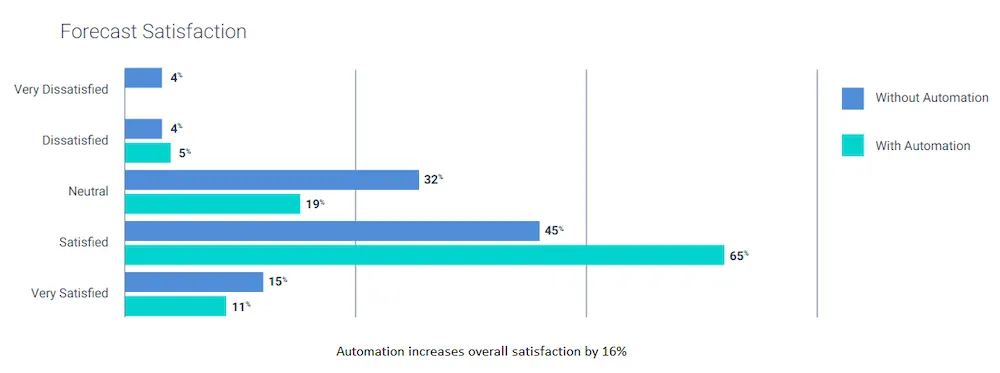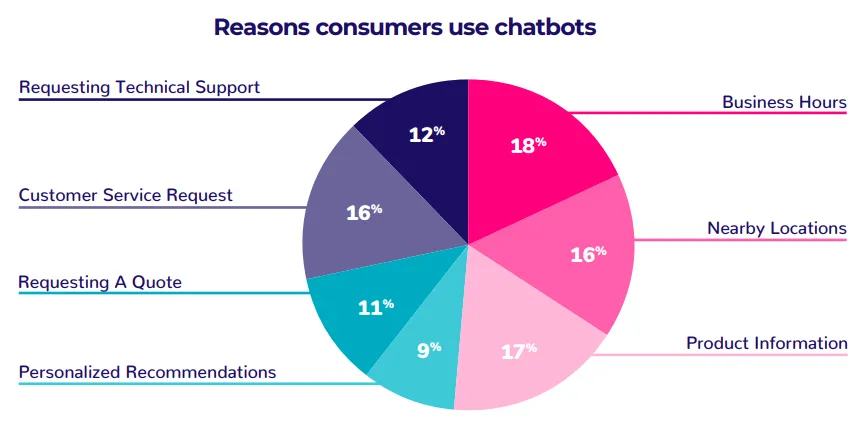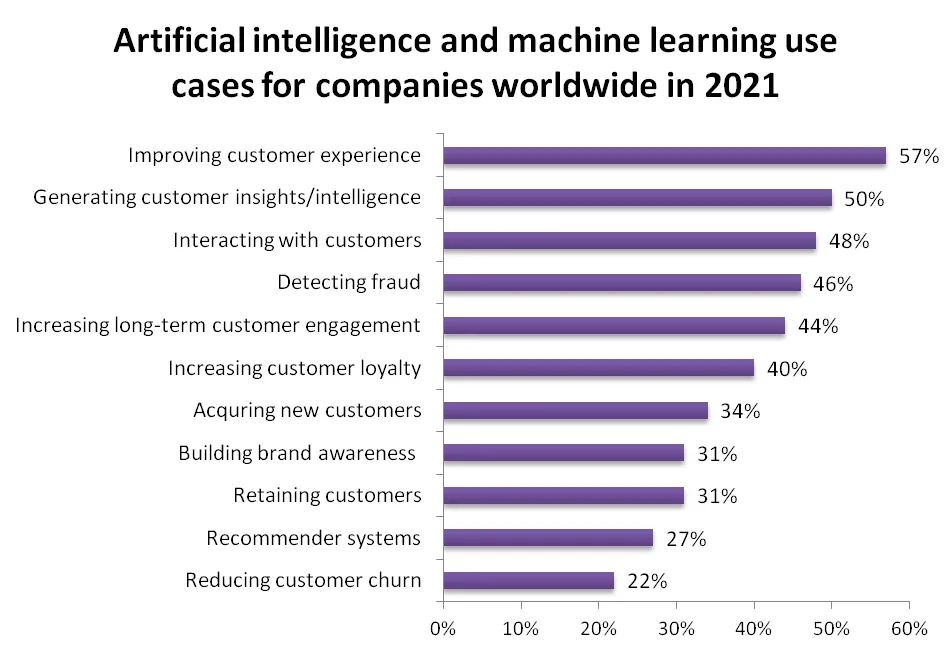
A solid sales forecasting process is vital for companies of all sizes and industries, including e-commerce and SaaS.
However, predicting future sales is notoriously difficult, and traditional sales forecasting methods are often inaccurate. In fact, nine out of 10 sales managers report missing their forecast prediction by six percent or more.
There’s good news though: with the advances in artificial intelligence in recent years, AI is revolutionizing the way companies forecast demand and sales.
With AI you can generate accurate sales forecasts and actionable insights to promote business growth.
This post will explore five common ways to use AI for sales forecasting to help you make the best business decisions.
Why Are Sales Forecasts so Important?
When sales leaders can predict demand for the next week, month, or even year, it's easier to understand what your team will need and how to reach your goals. You can also set daily, weekly, monthly, or quarterly targets for individual sales reps and sales teams.
Sales forecasts help you identify future market trends and economic factors that could affect demand. You can then take steps to safeguard your cash flow, which is particularly important for SMBs.
Most sales forecasts combine data on historical sales and customer behavior to make predictions. But manual forecasting is prone to human error, and inaccurate forecasts could spell disaster. For example, you may not have enough stock to meet demand, which could damage your reputation.
Sales forecasting software that uses AI and machine learning (ML) is a far more accurate forecasting method.
Thanks to workflow automation, AI forecasting software can analyze vast quantities of data from multiple sources, giving you highly accurate forecasts. It can also include measures like customer experience and sentiment to give you a more complete picture of your business.
Plus, ML lets you test the accuracy of your forecasts, helping improve the software’s mathematical models over time.
 |
5 Ways AI Can Improve Sales Forecasting
AI and machine learning models analyze vast quantities of data in real-time. This means they can identify relationships between variables that humans may otherwise miss. So, AI sales forecasts help business leaders plan more effectively in both the short and long term.
There are several ways to use AI for sales forecasting and process improvements, including:
- Financial data processing and analysis
- Chatbot customer service
- Lead generation and performance scoring
- Customer sentiment analysis
- Predictive analytics
Let's go through them in detail.
Improve Financial Data Processing and Analysis
AI tools can detect fraud and predict cybersecurity risks, improving security for you and your customers. You can also use facial recognition, biometric security features, and more to add an extra layer of protection.
AI forecasts can reduce financial risks too. For instance, by analyzing customer data (like credit score, income, and employment history), AI software can predict the likelihood of a customer repaying a loan. AI forecasting can also suggest how much you should loan to a particular customer.
In addition, you can combine AI forecasting with enterprise resource planning (ERP) software like distribution ERP software to integrate and streamline your business processes. With ERP software, you’ll get real-time insights into your business, helping you identify cost-saving opportunities and reduce risk. And with AI forecasting, you can use these insights to make better financial decisions.
AI software can also track market conditions in real-time to predict currency fluctuations. This is especially beneficial if your company operates in more than one country. After all, your forecasts need to account for different exchange rates and customer expectations.
Leverage Chatbot Customer Service
Chatbots can operate 24/7, letting you engage with customers consistently and resolve issues as soon as they arise. They can also integrate with your CRM and scheduling software so customers can book meetings and demos without waiting for your reps.
 |
This also means chatbots can constantly collect data from prospects and customers, essential for effective sales performance management. You can use this data to improve the accuracy of your sales forecasts.
Plus, you can build sophisticated predictive models that combine customer data with data on your past sales performance and external factors like inflation. Your reps can use these models to predict demand and identify new sales opportunities. These models can also recommend which prospects to pursue based on their likelihood of conversion or determine when it's time for a pricing change.
Once you’ve identified the most promising leads, your AI chatbots can nurture them by offering one-to-one customer service. They can also give customers personalized product suggestions and promote up-selling and cross-selling.
In addition, chatbots can segment customers according to their behavior and preferences. They can then predict which content will speak to their specific pain points.
By offering the right content at the right time, your reps will be more likely to land a sale, increasing their success rate一and your company’s revenue.
Better Lead Performance Scoring
AI sorts through vast quantities of data on your current and historical monthly sales and uses this information to identify the most lucrative leads and produce more accurate sales forecasts.
With AI, you can track each prospect’s intent to buy in real-time, helping you fine-tune your forecasting models and close more deals, as well as reduce churn. Sales organizations as a whole can make better use of their time, as they won’t waste time reaching out to prospects who aren’t ready to buy. This will also improve salesforce efficiency, which could save money in the long run.
AI can provide insights into the individuals who are most likely to become brand ambassadors. It can also identify which prospects have the most influence in a company, which is particularly helpful for B2B sales.
In addition, AI can analyze demographic, transactional, and other data from your CRM to fine-tune your lead-scoring models and highlight the best leads. Your reps can use this data to personalize the customer experience and take a data-driven approach to lead nurturing.
Plus, if you integrate cloud ERP software with your CRM, you’ll get access to real-time insights into all aspects of your business. You can use these insights to improve efficiency for all your teams, including your sales and customer service teams.
That means faster lead scoring and more opportunities to fix bottlenecks in your sales cycle that are preventing prospects from converting.
 |
Deeper Customer Sentiment Analysis
AI and ML collect vast datasets on customer behavior, preferences, purchases, pain points, and more. You can use these insights to generate accurate sales forecasts that consider a range of variables, like seasonality.
AI and ML tools can also use natural language processing (NLP) to capture verbal and non-verbal cues and analyze customer sentiment.
If a customer is positive about your brand, your reps can nurture them and turn them into a brand ambassador. If a customer is negative about your brand, your reps can find out why and see if there’s anything they can do to change that.
You can track customer sentiment over a fixed period of time for each of your products or services and feed the data into your sales forecasts. Then, you can adjust your strategy and measure the impact of your changes on consumer sentiment. In this way, you can continually adjust your sales strategy to better meet customer needs.
Overall, AI forecasting that uses customer sentiment analysis can provide actionable insights your reps can use to increase engagement and close more deals.
Build Predictive Analytics to Understand Your Data Better
Predictive analytics use historical and current data to identify patterns and probabilities. This helps you better understand market trends and future demand so you can make smarter business decisions.
There are several ways you can use predictive sales forecasts, including:
- Lead scoring
- Setting a budget for the year
- Improving the customer experience
- Setting realistic business goals
- Optimizing resources, such as inventory and staffing
With predictive analytics, your forecasting software can continuously update your sales forecasts. This makes it easier to identify risks and opportunities early on. You can automate rolling forecasts, freeing up your sales managers for other important tasks. Plus, ML allows the software to improve its forecasting abilities over time, resulting in even greater accuracy.
By predicting future customer behavior, you can use optimization to improve sales pipeline and create a frictionless experience, even in periods of high demand. So, predictive forecasts help you stay ahead of the competition.
 |
Is AI the Future of Sales Forecasting?
Sales forecasting helps businesses understand historical data so they can optimize resources, manage cash flow, and provide a first-class customer experience. But traditional sales forecasting methods are becoming outdated.
The use of AI in sales improves the accuracy of sales forecasts by combining detailed sales data with real-time customer insights. This provides a more complete picture of your business, so you can make smarter decisions.
There are several ways to use AI for sales forecasting, such as financial data analysis, lead scoring, and predictive analytics. All these uses add value to your business by improving customer satisfaction and helping your reps close more deals. Implementing AI in sales forecasting also allows for more efficient budget allocation, ensuring resources are used where they're most needed. And that’s great for your bottom line.










